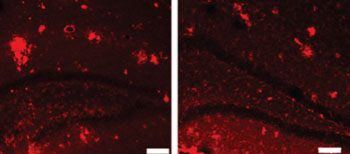Alzheimer's Disease Symptoms Reversed for the First Time
By MedImaging International staff writers
Posted on 24 Feb 2015
Researchers at the Sunnybrook Research Institute (Toronto, Canada), have found a way to reverse some of the symptoms of Alzheimer's disease, using Magnetic Resonance (MR) imaging-guided focused ultrasound. Posted on 24 Feb 2015
The researchers, led by Kullervo Hynynen, PhD, of the Sunnybrook Research Institute, used transgenic (TgCRND8) mice with a condition similar to Alzheimer's disease for the study. The research was partly funded by the US National Institute of Biomedical Imaging and Bioengineering (NIBIB; Bethesda, MD, USA).

Image: Plaque abnormalities in the brain of a mouse (left), and brain tissue treated with MR imaging-guided focused ultrasound (right) (Photo courtesy of Kullervo Hynynen, Sunnybrook Research Institute).
Alzheimer's Disease affects approximately 5.2 million people in the United States (US), and there is currently no treatment for the disease.
The researchers used MR imaging-guided focused ultrasound, and a microbubble contrast agent to temporarily open the Blood-Brain Barrier (BBB). This enabled more effective delivery of drugs to the brain.
Results show that the treatment improved cognition and spatial learning in the mice that could have been caused by reduced plaque, and increased neuronal plasticity, as a result of the focused ultrasound treatment. No tissue damage or negative behavioral changes in the mice was found.
Steven Krosnick, MD, of the NIBIB, said, “The results are an exciting step in the search for Alzheimer’s treatments, but there is more to be done. There are limitations on the memory tests that can be done on mice, and human cognition is significantly more complex. Hopefully these results will open doors to more research on how MR imaging-guided focused ultrasound could benefit cognition and perhaps be magnified by using other therapeutics in conjunction with this method.”
Related Links:
Sunnybrook Research Institute
[US] National Institute of Biomedical Imaging and Bioengineering (NIBIB)














